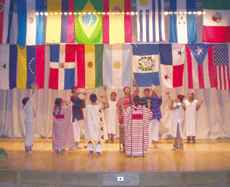RAWA Talk Tells Story Beyond the Headlines
September 25, 2002
The Revolutionary Association of the Women of Afghanistan (RAWA) is an independent organization in Afghanistan working to empower women in the war torn country. The group works underground in Afghanistan, has satellite groups in Pakistan operating from refugee camps, and has supporters in countries such as the United States as well.
In an attempt to bring information from beyond the headlines to the UMass Boston community, the UMB Women’s Center sponsored an event featuring Alicia Lucksted from the U.S. RAWA Supporters Network.
Lucksted presented a two-part program to attendants of the forum, which took place on Friday, September 13.
RAWA is concerned with the need for Afghan women to empower themselves and “peacefully resist fundamentalist domination” and their literature outlines goals of the organization as “secular democracy, participation in public life for women and girls, and respect for all human rights.”
The popular media in the United States has been portraying a massive turnaround in women’s rights since the Bush administration toppled the brutal Taliban regime earlier this year. RAWA, however, paints a very different picture of the situation.
Lucksted, who is a US supporter of the organization, relayed the startling sequence of events over the past few decades in Afghanistan. Students who gathered in the Wheatley fourth floor lounge received literature informing them that prior to the Taliban’s reign there were factions at work in Afghanistan who committed “such atrocities as gang rapes, abductions, forced marriages, looting, [and] killing civilians.” Those atrocities occurred mainly between 1992 and 1996. Many such factions are now in the Northern Alliance, which has regained power in the Afghan government.
RAWA is an organization “trying to be a conduit and a voice for women and refugees who don’t really have access to the media and things like that,” as described by Lucksted, and judging from the footage and documents she shared, they are fairly successful.
After describing some of the relief efforts, which RAWA currently sponsors inside of Afghanistan, as well as in refugee camps, the RAWA supporter showed a video with “documentary footage” of what it is like inside the country’s borders. Probably the most shocking piece of that footage was a film of a woman being executed at point blank range in a stadium in Kabul. The woman was accused of killing her husband, a case that was never proven. She was executed on a Wednesday. Lucksted said executions usually take place on Fridays, “but Friday was considered too holy a day to execute a woman.”
It is “encouraged for people to attend executions and amputations as a form of social control,” Lucksted relayed, shops were closed down, roads were blocked, and people were gathered from off of the streets to attend.
This particular footage was then smuggled out of Afghanistan and into Pakistan. “When RAWA members were here [in the US] in the year 2000, they brought a copy of [this footage] and tried to get various different media outlets to show it, and the media outlets wouldn’t do it, they just declined, without really any explanation and then it was used as well as a lot of other footage” in a recent documentary. “However, since September 11, it became really in demand, as well as some of [RAWA’S] other footage.” Lucksted expressed the fate of that footage as “just a comment on how we are consuming the various images that people try to show us.”
Obtaining such footage can be very dangerous for the women of Afghanistan. One technique is to film through the burqua, the traditional and very concealing clothing women wear in that country. And that is exactly what these women do.
Ginn Norris, the new coordinator for the UMB Women’s Center said that she has supported RAWA as long as she has known about their organization. Norris put on a “punk rock show” for RAWA earlier this year at Mass College of Art here in Boston. At that point, she got in touch with the organization in order to obtain information to distribute at the benefit and was added to their email contacts list for Lucksted, the closest official East Coast representative.
When Lucksted was scheduled to do a speaking arrangement in Marblehead, she emailed all the people in the New England area offering her services for speaking engagements and/or meetings in the area. Norris responded and suggested the idea of coming to UMass Boston. Lucksted agreed.
The new coordinator titled the forum “Beyond the Headlines” because she feels that this was an opportunity for the UMB community to come together to do just that, go beyond the popular media’s representation of this issue. “In the current political climate, it’s important for people to know what’s really going on,” she said.
Norris also said that she plans to bring another representative from RAWA, Anne Brodsky, to the harbor campus next April. Brodsky is currently at work on a book titled With All Our Strength: Revolutionary Association of the Women of Afghanistan. The event in April, in addition to being another information session, will be a benefit for RAWA. She is working on plans for another punk rock benefit show in the meantime.
“It’s my way of helping without being a financial backer,” Norris said, because she “would like to help” the organization in their mission.
For more information on RAWA, visit the UMB Women’s Center located in the Wheatley Building on the fourth floor.





















































